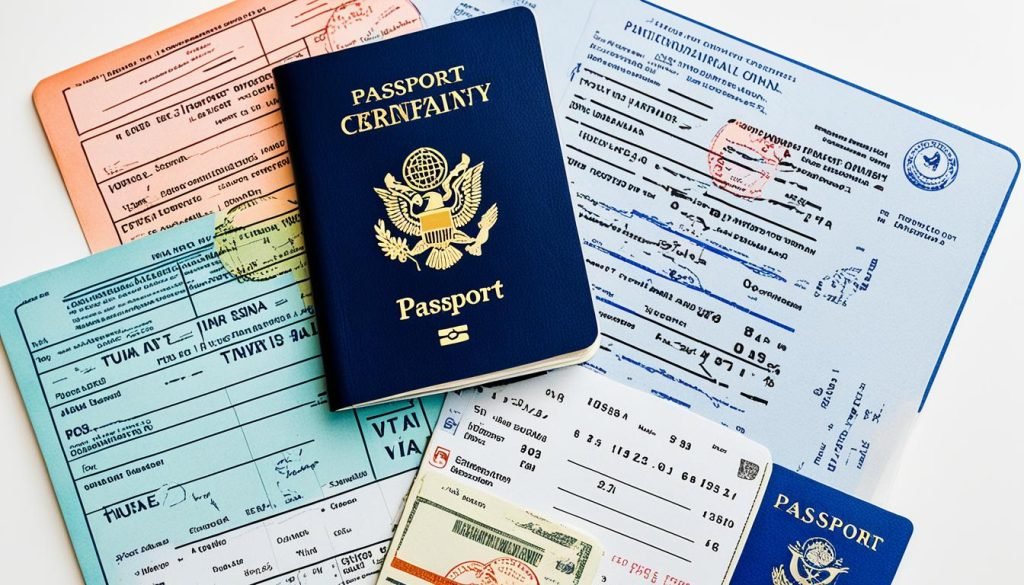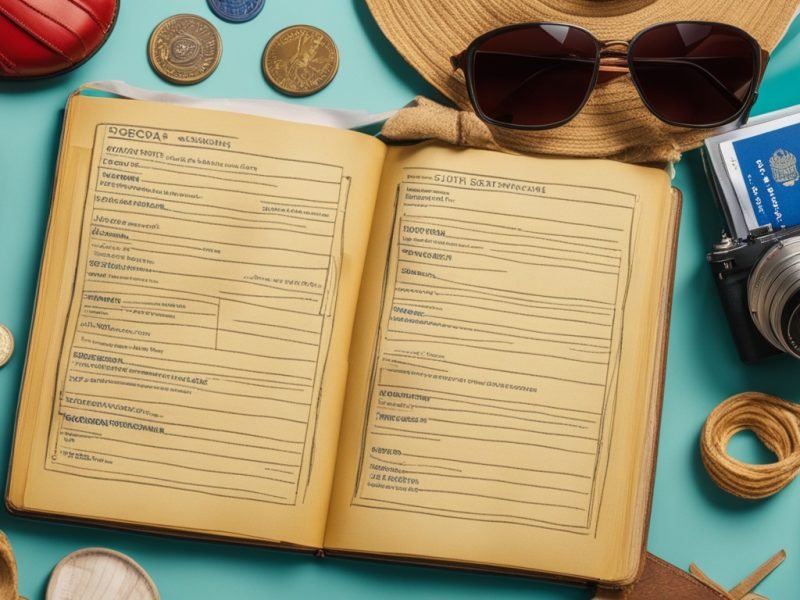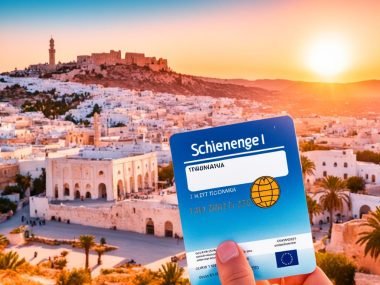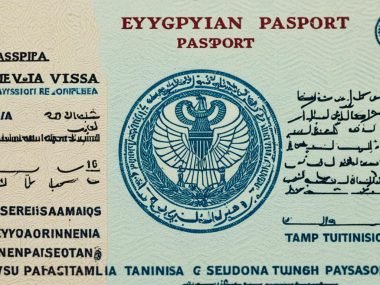Did you know that over 600,000 British citizens visit Tunisia each year? This place is special because it has lovely Mediterranean beaches, ancient sites, and lively markets. But, there’s more to getting ready for Tunisia than just packing.
It’s super important to know about the Tunisia travel requirements for a smooth trip. British travellers need to make sure their passport is good for their whole stay. Right now, you don’t need COVID-19 tests or vaccines to go to Tunisia. Yet, it’s smart to keep up with any health news.
Talking to the Tunisian Embassy in the UK can help. They can tell you if you need more papers for your journey. Things like having two citizenships can make entry tricky. Some places also have warnings due to safety concerns. It’s a good plan to have travel insurance. It covers health troubles and other emergencies.
Key Takeaways
- Ensure your passport is valid for the entire duration of your stay.
- Consult with the Tunisian Embassy in the UK for any additional documentation requirements.
- Stay informed about potential health advisories and maintain comprehensive travel insurance.
- Be aware of regional travel advisories linked to security risks.
- Prepare a Tunisia travel checklist to cover all essential travel requirements.
Entry Requirements for British Citizens
It’s important for British citizens to know about travel documents for Tunisia before visiting. Having all necessary documents ready makes entry smooth. It helps avoid problems at the border.
Passport Validity
Your passport must be valid for your whole stay in Tunisia. This is very important to follow the British passport validity Tunisia rules. Always check your passport’s expiry date before planning your trip.
Visa Requirements
No visa is needed for visits up to 90 days by British citizens. However, make sure your passport gets stamped when entering. Not getting a stamp can lead to issues when leaving Tunisia.
Dual Nationals
If you’re a British citizen with another nationality, pay attention to entry and exit rules. Use the same passport to enter and exit Tunisia to keep things simple. Talking to the Tunisian Embassy in the UK can give you more details and the latest travel documents for Tunisia advice.
Understanding Tunisia’s Visa Regulations
Planning your trip to Tunisia? Know the visa rules for British folk. This bit covers visa info, passport stamps, and fines for staying too long.
No Visa for Short Visits
Coming for a short visit? Britain’s citizens don’t need a visa for up to 90 days. It’s great for holiday-goers and short-term business folk. Just make sure not to overstay to dodge issues.
Getting Your Passport Stamped
When you arrive, get your passport stamped right away. It’s key. Not doing so can make leaving tough.
Penalties for Overstaying
Remember, don’t stay over 90 days without a good reason. Else, you might get fined or sent back home. Knowing about overstaying fines Tunisia and keeping track of your time there is smart.
Know these Tunisia visa information tips well for a fun, worry-free trip. Stick to the allowed time and follow the rules coming in and going out.
Getting Travel Insurance for Tunisia
It’s key to get the right travel insurance for Tunisia. This keeps you safe from surprise health problems or travel troubles.
Importance of Travel Insurance
Travel insurance for Tunisia is a must for your trip plans. It gives you comfort, knowing you’re covered for things like lost bags or surprise cancellations.
Coverage for Emergency and Medical Services
Make sure your travel insurance for Tunisia covers emergencies. It should include emergency medical care, staying in hospital, and medical evacuation if needed. This helps avoid big costs in emergencies.
Implications of Ignoring FCDO Advice
Listening to FCDO travel advice for Tunisia is key. If you ignore their advice, you might lose your travel insurance cover. Always check the FCDO updates. Do this before and during your trip. This keeps your insurance working well.
| Aspect | Details |
|---|---|
| Emergency Services Coverage | Includes emergency medical care, hospitalisation, and evacuation. |
| FCDO Travel Advice | Regularly check updates to keep your insurance valid. |
| Importance | Protects against unforeseen issues like cancellations or lost baggage. |
Essential Travel Documents for Tunisia
Travel to Tunisia needs the right documents. This will make your trip smooth and worry-free. Here’s what you need to go into Tunisia.

Passport
Always carry your passport. Check it’s valid for your whole trip in Tunisia.
Travel Insurance Policy
Travel insurance is crucial. It helps with unexpected problems, like medical issues or cancelled trips.
Proof of Accommodation
You need to show where you’ll stay in Tunisia. A booking confirmation works well for this.
Return or Onward Travel Tickets
You must prove you’ll leave Tunisia on time. Carry documents that show your next travel plans.
With these essential documents, entering Tunisia will be easy. You’ll have a great time in this lovely place.
Tunisia COVID-19 Entry Requirements
Tunisia COVID-19 travel rules are now easier. You don’t need tests or shots to enter. But, keep checking for new updates. Rules can change quickly.
- Monitor official health advisories regularly.
- Stay informed on any reinstated Tunisia entry restrictions COVID-19.
Customs Regulations in Tunisia
When you travel to Tunisia, knowing the customs rules is key. You should know about the money rules, banned items, and drone use. This helps avoid surprises.
Bringing Foreign Currency
If you bring a lot of foreign money to Tunisia, you must tell the customs. It’s important to follow these rules to avoid losing your money. For more details, check the Tunisian customs website.
Prohibited Items
Some items can’t be brought into Tunisia. Bringing banned items could get you fined or have your things taken away. Always check the latest list of what you can’t bring to stay safe.
Rules for Drones
The rules for drones in Tunisia are very strict. If you bring a drone without permission, it will be taken away. Make sure you get the right permissions to use a drone. Learn the drone laws to avoid trouble.
| Aspect | Details |
|---|---|
| Foreign Currency | Declare amounts exceeding set limits |
| Prohibited Items | Check list of banned goods |
| Drones | Authorisation required |
Health and Vaccination Guidelines
Good health is key when travelling. Knowing health tips for Tunisia is crucial for safety. Follow Tunisia health guidelines. Make sure to have the right travel vaccines for Tunisia. This will help avoid various health problems.
Recommended Vaccinations
Talk to healthcare providers before going to Tunisia. Check the needed travel vaccinations Tunisia. It’s suggested to have shots like MMR, diphtheria-tetanus-pertussis, and polio up to date. Also, vaccines for Hepatitis A, Hepatitis B, and Typhoid might be needed. It depends on your visit’s details.
General Health Advice
It’s also important to follow health advice for travellers. Keep up with the latest Tunisia health guidelines. Knowing these will tell you about possible health risks and how to stay safe. Always drink bottled water and keep clean. Be careful with street food too. Checking the local healthcare and what medical help is available is also key for a good trip.
Safety and Security Tips for Travelling in Tunisia
Going to Tunisia is exciting. But being safe is key. Pay attention and know what’s happening around you. Follow simple tips to stay safe.

Crime Prevention
Keep your things safe. Keep your valuable items close. Don’t show off expensive stuff.
Use safes in hotels. Be careful in busy places. This helps avoid theft and scams.
Areas to Avoid
Know where not to go. Some places are riskier. The U.S. Embassy gives updates on these areas.
It’s smart to check these updates. They help travellers avoid danger spots. Including places with crime or terrorist acts.
Handling Demonstrations and Protests
Protests are common but risky. Stay away from big crowds and protests. If you see a protest, leave quickly.
Terrorism Threats
Terrorism is a risk in some areas. It’s important to know this. Always look for official travel advice.
Choose well-known tourist spots for safety. These places have better security.
Remember these tips for a safer trip. They help make your visit to Tunisia better and safer.
What Do I Need To Travel To Tunisia?
When planning a trip to Tunisia, certain steps are a must. Making sure your passport is valid during your trip is key. If it’s not, you might not be allowed in.
It’s also vital to get good travel insurance. This should cover medical problems and the cost of getting you home. I bought a policy that fit my needs and the risks of my trip. It’s a good idea to stay updated on health advice.
Learning about Tunisia’s culture and rules matters a lot. This knowledge made my stay better and my trip more enjoyable. Understanding local norms is important for smooth travel.
Having all necessary documents is crucial too. These include proof of where you’re staying and tickets for leaving Tunisia. Border officials check these, so I kept mine handy.
Here’s a checklist to help with your Tunisia travel preparations:
| Preparation Step | Details |
|---|---|
| Check Passport Validity | Ensure your passport is valid for the full duration of your stay. |
| Secure Travel Insurance | Purchase a policy that covers medical emergencies and repatriation. |
| Familiarise with Local Customs | Understand cultural norms and legal expectations of Tunisia. |
| Prepare Essential Documents | Have proof of accommodation and return or onward travel tickets ready. |
Travel Restrictions and Advisory Notices
Before going to Tunisia, you should know the latest travel warnings. Keeping up with FCDO Tunisia advice helps. You will know the risks in different areas. This makes your trip safer and more fun.
FCDO Travel Advice
The Foreign, Commonwealth & Development Office (FCDO) has important advice for Tunisia visits. The security situation changes often. The FCDO gives updates and tips, especially for riskier areas. Following FCDO Tunisia advice keeps you away from danger.
Specific Regional Risks
Knowing the risks in Tunisia areas is key for a safe trip. Some places, mainly near borders and the south, are riskier. They have more dangers like terrorism. It’s best to avoid these areas. The FCDO website shares risk updates, so you can plan better.
Local Laws and Customs
Understanding Tunisian laws and customs is crucial. Tunisia has its own rules, including how to dress and behave. Respecting these rules is good. It helps you get along and not break laws by mistake.
| Key Advisory Points | |
|---|---|
| FCDO Advice | Regular updates on security, regional risks, and travel advisories |
| Regional Risks | Avoid high-risk regions, especially near borders and in southern desert areas |
| Local Laws and Customs | Adhere to local laws, dress codes, and cultural expectations |
Knowing about FCDO Tunisia advice, regional dangers, and local rules is crucial. Always look at the latest updates before and during your trip. This keeps you safe and respectful of the culture.
Practical Travel Tips for Tunisia
Travelling in Tunisia can be rewarding and safe with good prep. Here are some top tips to help you explore the country well and with respect.
Preparing for Desert Travel
When heading to the desert in Tunisia, telling local tour guides your plans is key. This way, someone always knows where you are, especially near military areas. Always carry plenty of water, emergency kits, and ways to communicate. These steps will make your desert adventures both safe and fun.
Using Technology Safely
Keeping your gadgets safe in Tunisia means being smart about theft and risky Wi-Fi. Use strong passwords and trusted VPNs. This keeps your personal info safe while you’re there.
Local Etiquette and Cultural Insights
Respecting Tunisia’s culture is crucial for good interaction. Dress modestly, especially in less city-like or traditional spots. Also, understand local ways, like dining manners and how to say hello. Showing respect through these actions makes your trip better.
Another tip is to be careful with people you meet on dating apps. Always meet in places where there are other people and let friends know your plans. Knowing these tips will make your travel in Tunisia smooth and safe.
Conclusion
Going to Tunisia is amazing if you plan well. Before you go, know about visa needs and documents. Make sure your passport won’t expire while you’re there. Also, keep up with travel news to stay safe.
It’s important to be safe and healthy in Tunisia. Get travel insurance that covers emergencies and health care. Follow the Foreign, Commonwealth & Development Office (FCDO) advice to keep your insurance valid. Knowing health tips and the needed shots makes your trip safer. Learning about local ways and laws shows respect and makes your visit better.
To stay safe in Tunisia, avoid risky areas and be careful at big events.
Always check the latest news from local embassies. This helps you stay away from trouble spots. Following these tips means you can take in Tunisia’s beauty safely and have fun.







